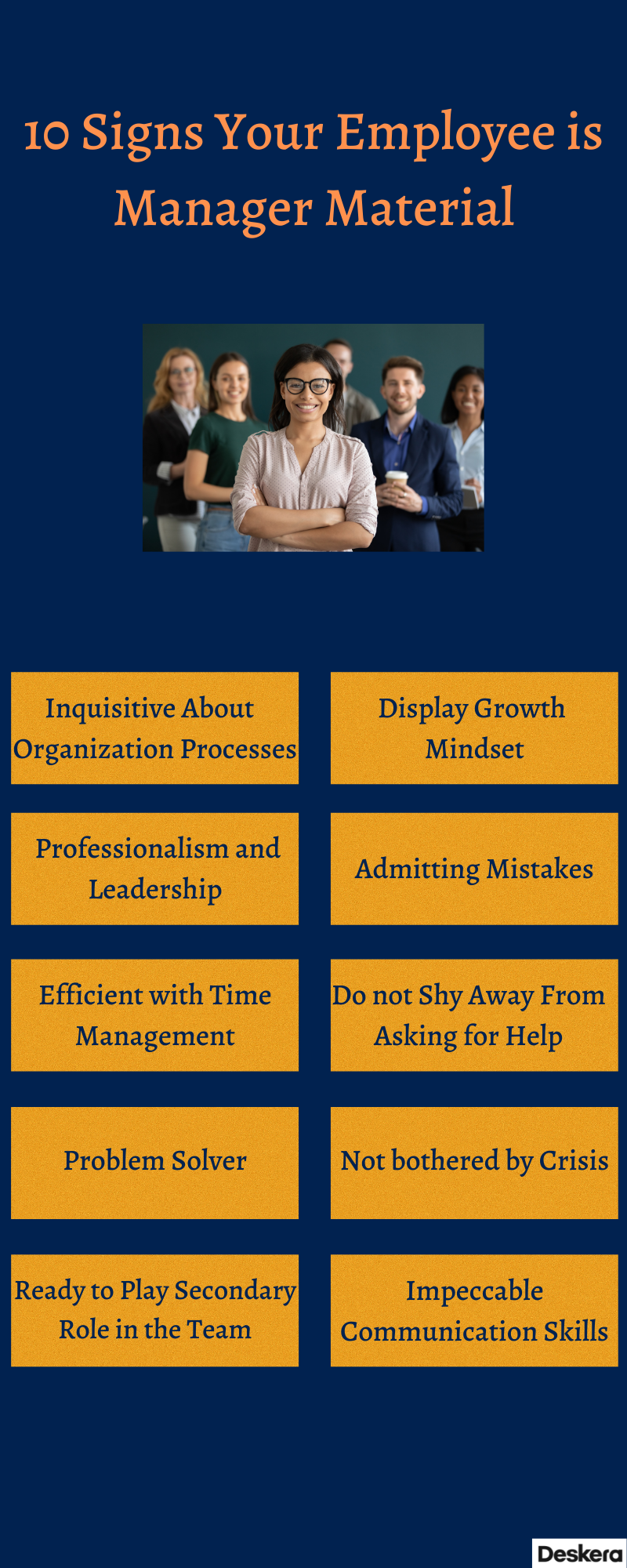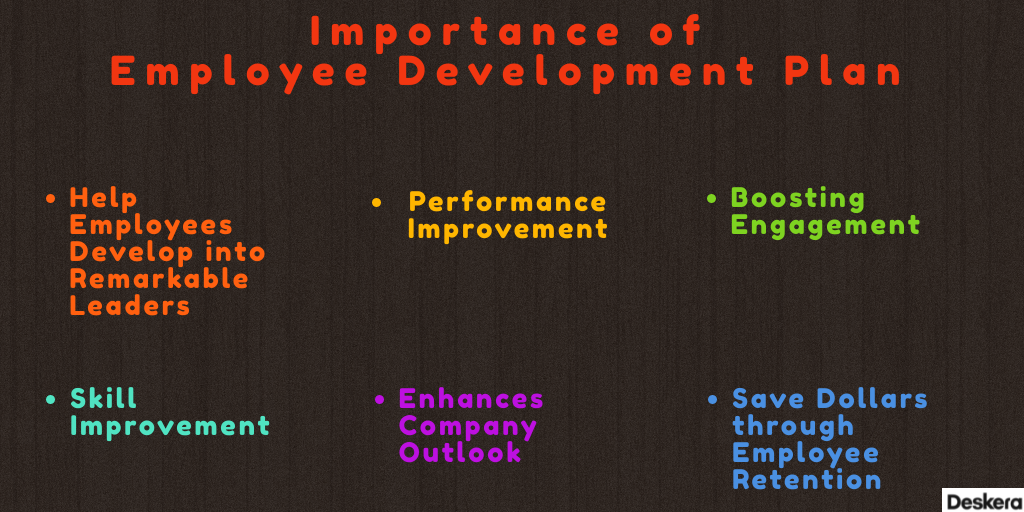The journey usually begins with a humble and committed employee who persistently works to bring together the diverse dynamics of their work area and focuses on achieving the set goals. It is only a matter of time before their efforts are noticed and manifested.
It's up to you to recognize those specific qualities in those employees so that you can move on to the process of taking them to the next level of leadership. However, there are various aspects that you and the employee need to take care of before the promotion takes place.

Let us look at the top 10 points that can help you gauge if your employee is manager material. Here are certain things that we will be learning in detail:
- Keep a keen eye on the deserving employees
- What is meant by the Peter Principle?
- How to know if Your Employee is Manager Material?
- Importance of Employee Development Plan
- Final Words
- How can Deskera Help You?
- Key Takeaways
Keep a keen eye on the Deserving employees
When you take a look at the teams in your office, you will come across a few them who are incredibly diligent and display all the abilities capable of taking them a step higher.
Here could be some more qualities that you can be mindful of in this special set of workers. These qualities include the following:
- Confident
- Empowered and driven by ideas
- Inspired and enthusiastic
- Agile
- Decision-makers
- Good at mentoring
When you spot this kind of caliber in the individual, you can be sure of the promotion they deserve. However, another essential factor cannot be possibly ruled out, which is the Peter Principle.
What is it? Let’s catch it in the next section.
What is meant by the Peter Principle?
The Peter Principle states that most organizational hierarchies have a tendency for each person to ascend through the ranks by promotion until they reach a point of relative incompetence. It basically presents this problem that almost every organization goes through.
To put it in simpler terms, the Peter Principle highlights the issue that once the employees start climbing up the ladder of positions, there is ultimately a time when they reach a position that they may not be adept enough to handle the role.
As a result, the Peter Principle is founded on the paradoxical premise that talented people will continue to be promoted, but will eventually be promoted into positions for which they are incapable, and will thus remain in that position.
How to tackle Peter Principle?
To tackle this issue, the companies need to come up with adequate training programs, learning sessions, guides, study material, and development plans for the employees. These should be provided to them even before they are promoted and should continue after they have been promoted.
Peter’s principle also suggests that instead of carrying out the inevitable promotions, they should be done randomly. However, this kind of arrangement does not go down well with the employees, and therefore, is not adopted.
It has, therefore, been summed up that providing training and skill development methods are the best forms to tackle the Peter principle.
How to know if Your Employee is Manager Material?
Your first step in this direction is to jot down the characteristics that you would want to see in the managerial candidate. You must know what qualities will be required to fill the shoes of a dedicated manager who works to achieve the company's goals.
We have listed 10 such features that you may seek in your employees and zero in on the one who exhibits them.
Let’s get started.
Inquisitive about Organization Processes
An employee with management potential is always eager to learn about the business as a whole. Are the results and goals achieved of the last completed project and is the current project turning in the direction as expected. How are the other teams coping with the pressure and striving to meet the challenges? Is the new team member comfortable as yet? These are some of the questions your potential manager will always be asking.
They have company at the core of their actions. They are passionate about the ongoing processes of the organization and keep themselves involved in the nuances of the happenings within the company.
If you spot an employee with these attributes, you must introduce them to the new methods and procedures to effectively help improve the company's functionality.
They Showcase Professionalism and Leadership
Being professional means being honest, competent, and accountable at the same time. If you observe your employee has been graced with these attributes, you know they can be good managers.
When we speak about a leader, we are not necessarily talking about someone who has impressive charisma only. We are essentially discussing the confident demeanor that has everyone’s trust and belief. It is a belief that their suggestions and opinions will ultimately be fruitful.
Helping out others, managing their tasks well, being responsible for their actions, and above all, is focused on the larger goal of the organization are some of the key requisites. The one with these traits can unquestionably be your next manager.

While you try to spot these qualities in your ideal candidate for the managerial post, you must also think about the consistency they can exhibit in their work areas. Are they good enough to represent the team or the company in front of the clients or in public? Do they display the qualities of a leader? What is leadership to them and can they be a source to motivate other employees? It is vital to address these questions as your manager will be a formal spokesperson of your organization.
So, you must ensure that you have chosen just the right individual.
Extremely efficient with time management
Look around, how well your employees have been spending their time. Apart from the obvious factors such as timely reporting in the office and completing their hours for the given shift, they must also ensure that spread out their workload evenly; to eventually get it completed in time.

Aside from this, it would be beneficial to prioritize their tasks and preempt the ones that need immediate attention. Also, not every day is a packed one at the office; there will be times when they do not have too many tasks on their plate. It is important you observe if they have been helping others in the team in such times. You can check if they are proactive and take the initiative to assist others in accomplishing their outcomes.
To summarize, your ideal managerial candidate needs to have an immaculate sense of time and give precedence to the jobs to be done at the earliest.
Problem Solver
So, you have a project which has taken a hit and in all likelihood, the team might overstep the deadline. In short, they have a tall problem facing them. How are you going to inform the client about the delay? How do you expect the client to react and what would be your response to that?
Note, which employee comes up as a problem-solver. Who takes the lead to develop innovative solutions to overcome this hurdle.

You will witness people who are focused on the solutions. They are not the ones who would look around for their manager to guide them on the steps to take; they simply generate solutions. The kind of employee who exhibits this mannerism should be the certain choice for the promotion. Be it handling a client with clever communication or encouraging the team to put in extra effort, this employee will take all the steps to convert the problem into an opportunity; and finally, come out of it victorious.
They are ready to play a secondary role in the team
When we talk about playing second fiddle in the team, it does not imply that they lose their importance or relevance in the team. It simply means that they delegate their tasks efficiently to others who can see it through.

So, in other words, we are looking for an individual who not only recognizes all the minor and major jobs within the team but also keeps a close watch on who competently completes those. They let the other team members take the lead for a particular task and are not scared of giving away the due credit. This kind of humble attitude leads to them earning respect from all around and makes them dependable in times of crisis.
Ego is alien to them and all that matters is reaching the stage that is advantageous for all involved. Such persons do not shy away from appreciating others despite them being the driving force behind the successful outcomes. Humility comes easily to them, which consequently translates into the immense reverence they hold.
Display Mindset of Growth
Training leads to development and growth. The skills and knowledge your employee possesses shows their capability to tackle the different tasks at work. Observe how they have grown over time and what all new skills have they acquired to boost performance at work.

Make a note of any employee who signals development. Learn how they strive and plan to bring about the change of development and growth. If any of your employees appear to be keeping knowledge and growth as their top priorities, you must know you have found your new manager.
Managers in the making are always up for a new training program or learning sessions that help them enhance their skillset. Not only do such programs prepare them for higher roles but also effectively improve their productivity. So, no matter the difficulties and challenges, they tend to rise to the occasion and display agility to give their best performance.
Admitting mistakes is not difficult for them
To err is human, and indeed so. There are few ways to escape mistakes in the office or any other sphere of life. However, it is paramount that you admit it honestly and move swiftly to rectify it.

Having personal accountability as a trait is crucial for aspiring managers. Furthermore, they treat mistakes as a learning experience. Employees who acknowledge their mistakes, learn from them, and move beyond them with determination to not repeat them can be termed as a true claimant for a manager's position.
That said, smart employees who have managerial capabilities have already observed their manager's and seniors' ways of handling such situations. They have already grasped how to take things to the other shore with the least amount of damage. To summarize, an accountable person who willingly and honestly confesses their errors can be considered for promotion to the role of a manager.
They do not shy away from asking for help
There’s always a time when you are unprepared for a specific scenario and you need guidance to sail through the tough times. There could be various reasons for that. Lack of experience or training could be the top two possibilities due to which one faces such circumstances.

However, an employee who identifies their own limitations and asks for help where required certainly displays signs of an efficient employee. They unquestionably seek help in tasks they feel they are incapable or fall short of completing. As a matter of fact, they clearly know when they should ask for help.
Seeking help implies that the individual yearns to learn more and expand the horizons of their knowledge. This also shows their sincerity and dedication to getting the tasks completed even if they have to borrow help from others.
These qualities ultimately lead them to be accepted as respected leaders.
Crisis does not bother them
The recent pandemic situation has tested the patience and potential of many employees and managers. With commotion spread across the entire corporate and diverse industrial sectors, managers have been on their toes in managing things. With the intense critical stages, it has been tough for the managers to shoulder the chaos.
However, isn’t it rightly said that leaders are made in times of crisis!
We must understand what exactly happens in a crisis. Most of your employees do not have the direction to progress, and they eventually lose track of their goals. However, the employee who has clarity and provides the same to all the other group members can be qualified for the next pedestal.
In other words, more than any other factor, a crisis is the time when you may be able to spot your ideal managerial candidate.
They have impeccable communication skills
Managers have to communicate a lot, including everyone, from subordinates to clients to seniors in the company hierarchy. There are so many different kinds of messages they need to pass on.

For example, a project update that must be provided to the client needs to have a tone that has the assurance that it would be successfully completed in time. Similarly, if an employee has to be informed about their termination, there is a specific way it needs to be done.
All these and beyond, a manager must be equipped with extraordinary communication skills to represent the company on the various corporate and industrial platforms. Additionally, they must understand that communication is not all about speaking. Listening is as much an important part of a conversation as speaking. Being a good listener for effective communication is critical to the process.
Should You Create an Employee Development Plan?
Having taken a good long look at the top ways to identify the next manager among your employees, you must also recognize if you need to create gateways for developing and nurturing your existing set of employees.
What if some of your employees have the right qualities but need a push to grow into individuals matching the manager's caliber? Identify if an employee development plan would help the cause.
If your organization is undergoing a situation that demands the induction of a dynamic and energetic manager, then introducing a development plan can work magically well.
Importance of an employee development plan
When an organization invests in a plan such as this, it could unravel a lot of potential in the employees which can then be used to establish better results.

Here is what you can achieve through a comprehensive employee development plan:
- Help Employees Develop into Remarkable Leaders
- Performance Improvement
- Boosting Engagement
- Skill Improvement
- Enhances Company Outlook
- Save Dollars through Employee Retention
An employee development plan entails the process of guiding an individual in their professional journey to achieve goals. Also, the plan aims to accomplish successful outcomes in the given time frame. This entire exercise could be extremely fruitful for both, the employee as well as the organization in the long run.
Final Words
Turn your employees into extremely valuable assets by catalyzing their growth through competent and powerful training programs. Drafting a strategy to spot the manager and honing the skills of the existing adept employees will eliminate the need to hire new ones.
Doesn’t it help your budget and save you the exercise of a fresh hiring process?
As a senior, you should identify the potential leader, create platforms for skill-building, and set up procedures to tap the true talent among your workforce.
How can Deskera Help You?
Deskera People allows you to conveniently manage leave, attendance, payroll, and other expenses. Generating payslips for your employees is now easy as the platform also digitizes and automates HR processes.

Key Takeaways
It's up to you to recognize unique attributes in that personnel so you can go on to the next step in their leadership development. When you glance around your office, you'll see that a few individuals are highly dedicated and possess all of the skills necessary to take them to the next level.
- Individuals who are inspired, confident, and good decision-makers can be considered apt for the role of a manager
- When you look at your office's teams, you'll notice that there are a few individuals that are really dedicated and possess all of the skills necessary to propel them forward
- Peter Principle is an important aspect that needs your attention. It is founded on the paradoxical premise that talented people will continue to be promoted, but will eventually be promoted into positions for which they are incapable, and will thus remain in that position
- Spotting an able employee who could be the next manager can be a daunting task. Few traits and characteristics can signal if they are the one who deserves promotion
- Inquisitiveness and being interested in organization processes are potential managers' signs. They have company at the core of their actions and are passionate about the ongoings of the organization
- They are dynamic and professional to the core. Honesty, competency, and accountability are some of the features they showcase
- They are good with managing their time. From juggling between various tasks to prioritizing the important ones, they perform their duties in the timely manner
- They are problem-solvers who persistently look for solutions during the tough times. They are not the ones who would look around for their manager to guide them on the steps to take; they simply generate solutions
- Leadership comes naturally to them. Helping out others, managing their tasks well, being responsible for their actions, and above all, is focused on the larger goal of the organization are some of the key requisites
- They do not find playing secondary role in the team difficult. They let the other team members take the lead for a particular task and are not scared of giving away the due credit
- They march forward with a growth mindset. Observe how they have grown over time and what all new skills have they acquired to boost performance at work
- They readily admit mistakes. Furthermore, they treat mistakes as a learning experience.
- They do not shy away from asking for help. Seeking help implies that the individual yearns to learn more and expand the horizons of their knowledge
- A potential manager can combat crisis really well and has clarity which they propagate to all the other group members
- A manager must be equipped with extraordinary communication skills to represent the company on the various corporate and industrial platforms. Additionally, they must understand that communication is not all about speaking.
- If your organization is undergoing a situation that demands the induction of a dynamic and energetic manager, then introducing a development plan can work magically well
- An employee development plan entails the process of guiding an individual in their professional journey to achieve goals
Related Articles














